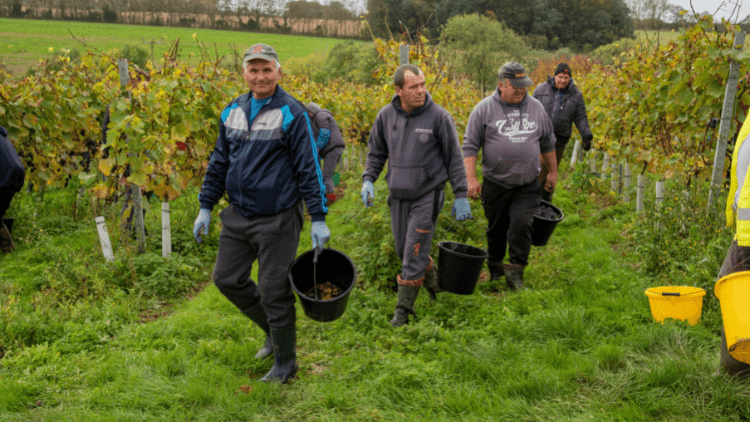In a world that is ever more interconnected it is essential to question naturalised dividing lines and build solidarity.

Populist politicians across the world make efforts to mobilise support from low-wage, precarious and otherwise marginalised workers, by claiming that they will protect them from the depredations of ‘migrants’—foreigners, often racialised, who purportedly take resources from citizens. This mobilises an old fear: there isn’t enough to go around. But it assumes what is bad for migrants is good for citizens. This is far from always the case.
Take the claim that migrants ‘take jobs’ from citizens and that ‘fair’ immigration controls are needed to protect national workers from unfair competition. This rests on the ‘lump-of-labour fallacy’, which imagines there is a fixed number of jobs in a national economy and that migrants (or women, or young people or whatever group is the object of concern) simply substitute for citizens (or men or older workers) and vice versa.
Neither of these assumptions is correct. An economy is never a fixed size. And workers, whatever their skills, are not interchangeable: for many different reasons, many households would not, for example, see a female live-in care worker as readily replaceable by a male live-in care worker.
But there is a further issue to consider in the case of migrant workers: immigration controls do not simply facilitate a flow of labour to particular countries and jobs, but they are highly productive, making ‘foreigners’ and creating particular kinds of workers in certain types of working relationships. This is sometimes acknowledged with regard to undocumented workers, who are recognised as more vulnerable to abuse, exploitation and poor labour conditions because of their fear of deportation. But less attention is given to the ways legally working migrants are heavily constrained by immigration controls.
In most countries of the world people who work on migrant visas are subject to conditions, many of which would be considered a significant infringement of rights if they were imposed on citizens. Migrants may be tied to their employer, prohibited from claiming social assistance or health care, forbidden to join trade unions, required to take health and pregnancy tests, obliged to live on site and so on. Many find that they cannot vindicate the limited rights they do have because of racism and xenophobia, language barriers, administrative complexity or lack of knowledge.
For low-wage workers, these restrictions are typically combined with sponsorship requirements, which mean low-wage migrants depend on their employer for their (often highly temporary) right to stay in a state. Thus, employers have mechanisms of control over legal as well as undocumented migrants. Far from ‘protecting’ the labour market for citizens, immigration restrictions can mean employers actively seek to employ migrants.
Skill and suitability
Those who are deemed ‘low skilled’ are particularly vulnerable to these restrictions. Skill is a key factor in labour-migration regimes, with entrance facilitated for the high-skilled and restricted for the so-called ‘low-skilled’. Migrants or not, those who can turn their hand to everything—construction workers who dig and plaster today, and tomorrow lay foundations, bricks and tiles, and domestic workers who clean and cook, at the same time as caring for an elderly person—are considered ‘unskilled’. These are typically the most marginalised workers—often women, minoritised, disabled.
While unskilled work is depicted as work that anybody can do, not any body is however regarded as suitable for any job. Working together, immigration and skills regimes internationalise class distinctions while at the same time naturalising national divisions between workers.
This is evident in the claims about the supposed ‘natural’ abilities of individuals of particular nationalities, which are a feature of employer demand for migrant workers across the world. Different nationalities are ranked against each other, designated as better or worse, depending on what jobs are to be done where. Individual aptitudes can thus be characterised as ‘natural’, rather than demonstrating a skill worthy of recognition. To designate such physical and behavioural characteristics as ‘racial’ would be unacceptable, and rightly so, but describing them as ‘national’ can be presented as simple ‘common sense’.
What ‘migrant’ connotes
Categories such as ‘migrant’, ‘citizen’ and ‘skill’ are represented as technical but in practice they are highly socially constructed. The Australian back-packer working in a bar in Thailand or the American financier living in Hamburg may be subject to immigration controls but he is rarely regarded as a ‘migrant’. Yet the woman cleaning the banker’s flat may indeed be so regarded, even if she has never crossed an international border: the ‘migrant’ connotes impoverishment, negative racialisation or otherwise an association with backwardness.
This is how some people who have the legal status of citizens can nevertheless be described as ‘migrants’. Think of India’s 54 million internal migrants, whose vulnerabilities were so starkly exposed by the Covid-19 pandemic—or the descriptor ‘second/third-generation migrant’ or ‘person of migration background’, as a synonym for black and ethnic-minority citizens in Europe.
The distinction between the migrant and the citizen is in practice not clear-cut and racism and xenophobia are key to the production of ‘us’ as well as ‘them’. In many states these framings have been profoundly shaped by colonial histories. Colonialism entrenched and codified differences among people across continents, with continuing consequences for groups born in a country but nevertheless still imagined as ‘out of place’.
Citizenship removed
Infamously, in 2013 the Dominican Republic’s constitutional court removed citizenship from anyone who could not prove their parents were legal residents when they were born. As a result, 70-80,000 people were deported to Haiti over three years and unknown numbers moved ‘voluntarily’. In India the implementation of strict requirements for documenting citizenship and the publication of the National Register of Citizens in 2019 removed citizenship from 1.9 million people in Assam in the north-east. Individuals lacking documents or whose documents had ‘discrepancies’ were made stateless, removed from voting registers and rendered liable to imprisonment as foreigners—even if they had never moved from the village in which they were born.
In both countries, the vast majority of those affected were impoverished and marginalised. The mobilisation of ethnicity and ancestry to strip or otherwise undermine citizenship is, as with migration, a class issue.
Taken together, regimes of immigration and skills and of citizenship (and its removal) expose how the ambiguity of the term ‘national’ is politically utilised. ‘National’ can signify a legal relation with, or recognition by, the state—as in ‘national territory’ or ‘national citizenship’. But ‘national’ can also mean belonging to an imagined community, with the ‘nation’ understood very loosely as referring to cultural practices, languages and populations stretching back in time. Membership in the ‘nation’ is claimed through ancestry and often imagined as independent of and predating the state.
The ambiguity of ‘national’ means that it is possible to be a legal citizen but nevertheless not considered as belonging to the ‘nation’. History teaches us that neither citizenship nor membership of the ‘nation’ are stable statuses, and this is not only because of ethnicity: those who are homeless, who are disabled, have criminal records, do not conform, depend on social assistance, who are queer can be rendered vulnerable to state violence and exclusion.
Marginalised and migrants
Ideas of migration, belonging and the ‘nation’ mobilise race, labour, migration, gender and citizenship to divide and rank in hierarchies. Making connections, alliances and solidarities among marginalised citizens, whose presence is only tolerated, and migrants is vital for social justice.
In a world where increasing and grotesque inequalities are manifest within, between and across state borders, what is bad for migrants is not good for citizens. In fact, in the final analysis, it is bad for citizens too.
This was written as part of the ‘Reconstruction beyond the pandemic’ project at the European Trade Union Institute, with an edited volume due in early 2023. An earlier version of this post was published in Amandla.
Bridget Anderson is professor of migration, mobilities and citizenship in the School of Sociology, Politics and International Studies as the University of Bristol, where she is director of the specialist research institute Migration Mobilities Bristol.
